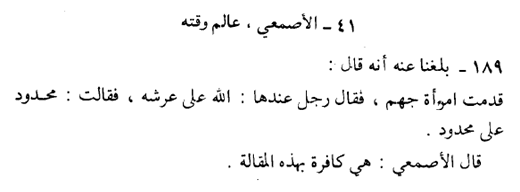
It has reached us that he said:

The wife of Jahm [bin Safwaan] came and a man said in her presence, "Allaah is above His Throne", so she said, "One mahdood (confined, limited, bounded thing) upon another mahdood."
Al-Asma'ee said, "She is a disbeliever by this statement (of hers)".
Source: "Mukhtasar al-Uluww" of adh-Dhahabee (p. 170).
Note that this is something that had reached adh-Dhahabee without any chain of narration being mentioned by him, but Ibn al-Qayyim mentions it from Ibn Abee Haatim, saying that Ibn Abee Haatim brought it with an isnaad (see here). Nevertheless, what is found in this quotation, which is that the Jahmites claim that Allaah being above the Throne means that He is mahdood, is correct regarding them - and this known through inference and deduction from their other sayings, and we have brought many statements of the Salaf who realized through inference and deduction, that the Jahmiyyah, at the beginning, were alluding to and hinting at their denial of there being a Lord above the Heaven.
- Ayyub as-Sakhtiyaanee (d. 131H) - see here
- Hammaad bin Zayd (d. 179H) - see here
- Abbaad bin al-Awaam (d. 185H) - see here
- Jareer ad-Dabbee (d. 188H) - see here
- Abdur-Rahmaan bin Mahdee (d. 198H) - see here
- Wahb bin Jareer (d. 206H) - see here
- Sa'eed bin Aamir ad-Dab'ee (d. 208H) - see here
- Abu Ma'mar al-Qatee'ee (d. 236H) - see here
The Jahmiyyah denied that Allaah could be above the Throne in order not to falsify their intellectual proof for demonstrating the universe is created through the presence of incidental attributes in bodies (ajsaam). Allaah being above the Throne would mean He is a "jism" (body).

